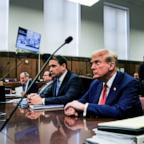Another Type of Democrat
Nov. 1, 2006 — -- With the US Congressional elections approaching fast, Democrats appear poised to make major progress in both the Senate and House, perhaps taking one or both chambers.
The myth of Republican superiority in foreign policy, which helped Republicans for so long (and sometimes even had some truth to back it up, especially in the 1980s and early 1990s), has been demolished by a failing operation in Iraq.
But Democrats, whatever the outcome this November, will need to do more than oppose Mr. Bush in subsequent elections.
In fact, the United States needs a vigorous two-party debate on foreign policy, with lots of new ideas on the table, to deal with predicaments from Iraq to Iran to North Korea--not to mention a host of other key issues such as energy policy and the rise of China.
In our new book, Hard Power: The New Politics of National Security, longtime Asia expert Kurt Campbell and I make a number of arguments about the centrality of the national security issue for the nation's well-being--and for the political fortunes of any party asking the nation for the privilege of leading it through dangerous times.
Among our key arguments are the facts that 25 million members of the voting-age public have worn the nation's uniform at some time, ensuring that defense matters will always be near the top of their concerns; that Americans know the special role the constitution accords presidents in making foreign policy decisions, meaning that they particularly expect presidential candidates to speak convincingly about their views on matters of war and peace; that defense issues have a certain straightforwardness that allows voters to assess a candidate's character when he or she discusses them (more than when they discuss say tax or health care policy); and that voters can sense when a candidate or party doesn't take national security seriously enough (note that a whopping 86 percent of voters who considered the war on terror the top issue facing the country in 2004 chose George Bush over John Kerry, as the latter purposefully avoided the war on terror issue as much as possible due to the advice of his top political advisors).
All these considerations argue strongly that anyone purporting to be able to sit in the Oval Office must focus squarely on national security as one of the top two or three issues of the day--not only in 2008, but in general. And it is worth underscoring what should be obvious. National security must be a top concern of a would-be president not only because voters insist on it, but because voters are right to do so. A president's first job really is to protect the country, and that is as it should be.




